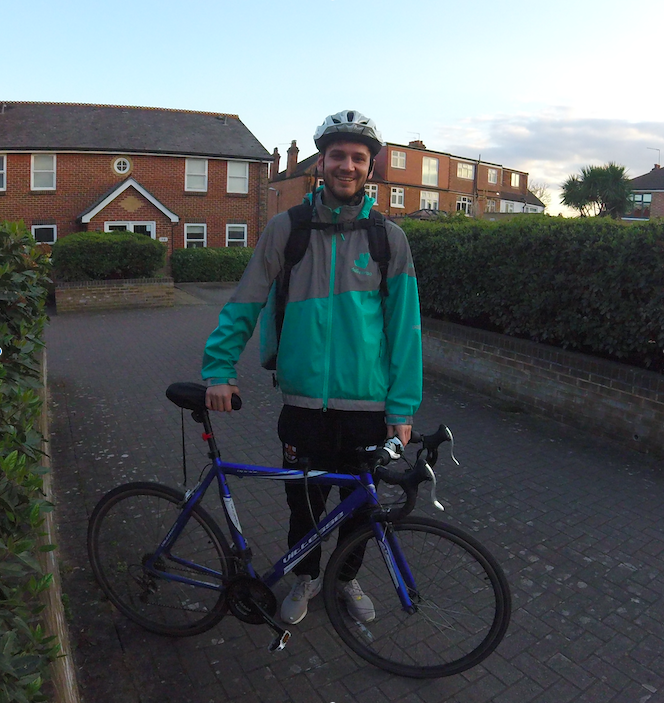Deliveroo's hiring spree starves riders of work

Donning his bright turquoise cycling jacket for the first time, Finn Bradley speeds through London’s deserted streets towards Shoreditch, an area the Deliveroo app assures him is ‘super busy’ with orders.
But it seems that other riders have had the same idea.
After waiting for two hours and not receiving a single order, Finn gives up and cycles home, dejected and downcast about his new job.
Lockdown has boosted demand for food delivery platforms, causing Deliveroo to double its army of riders to more than 100,000 over the past year.
The company claims to have frozen recruitment in areas where demand is not high enough, but riders across the country have felt deliveries dry up due to over hiring.
After two more fruitless shifts, Finn has all but given up on Deliveroo, explaining, “For me it wasn’t the end of the world because it’s not my full-time job. But I don’t know what I’d do if Deliveroo was my only source of income.”
“It seems like a lot of people are struggling with a lack of orders. You see a lot of riders waiting on street corners."
"We're all fighting for pennies - it's awful"
Cristian Lee Santabarbara has been working for Deliveroo in York for three years. He explains that “pre-pandemic you could make about £8.50 an hour, but with the oversupply you’re not making that anymore”.
“Deliveroo has over-hired people who are on furlough so the competition for orders is massive.”
Riders like Cristian don’t get paid when they’re waiting for an order, so Deliveroo doesn’t lose any money by having a large pool of workers on hand to meet fluctuating demand. Without any guarantee of wages, working rights, or personal safety, Cristian says he feels “expendable as hell.”
Deliveroo coming under scrutiny ...
Last month an investigation was published revealing poor pay and adverse working conditions of Deliveroo riders.
Research by the Bureau of Investigative journalism found that...
56% of riders earned less than an average of £10 an hour

One in three got less than £8.72, the legal minimum wage

One in six earned less than £6.45, the minimum wage for 18-20 year olds

Deliveroo disputed the Bureau’s claims, insisting that:
“Riders’ well-being is our absolute priority … Riders in the UK are paid for each delivery they choose to complete and earn £13 per hour on average at our busiest times.”

Bertie Lloyd, a rider from West London
Bertie Lloyd, a rider from West London
Deciding to put these claims to the test, I tailed Bertie Lloyd on his Friday-night shift in West London.
After a tiring three hours chasing a fairly constant stream of orders Bertie earned an average of £12 per hour.
However, it is wildly misleading of Deliveroo to use earnings from riders’ "busiest times" to justify an entire business structure.
Analysing Bertie’s past shifts reveals a huge discrepancy in earnings: during his longest 10-hour shift, he made an average of £3.80 per hour.
Since then, he’s tailored his shifts around peak times on the app, only working during the evening on weekends.
But unlike Bertie, riders depending on Deliveroo as their primary income don’t have the privilege of being so selective. A cyclist in Yorkshire investigated by the Bureau was logged in for 180 hours and was only paid the equivalent of £2 per hour.
Mounting pressure
Revelations of poor pay, and the recent Supreme Court ruling that recognised Uber drivers as workers rather than self-employed, has put pressure on Deliveroo to follow suit.
A campaign organised by the Independent Workers Union of Great Britain (IWGB) saw more than 200 riders take to the streets of London on the 7th April demanding better pay, employment rights and safety measures.
Alex Marshall, IWGB President (Credit: IWGB)
Alex Marshall, IWGB President (Credit: IWGB)
Safety
Willem Lord, a part-time Deliveroo rider in London, likes the flexibility of his work, but expresses concerns over a lack of personal safety protections:
“If you do get into an accident your livelihood is completely screwed because you have no cover. Your bike is screwed, you might be physically hurt, and on top of that you can’t earn an income … so your life can fall to pieces pretty quickly due to a workplace hazard.”
A recent survey by the IWGB raised grave concerns about the safety of gig economy workers. It found that:
Made with Visme Infographic Maker
What’s next?
Deliveroo was thrust into the limelight once again last month when it’s highly-anticipated opening on the London Stock market saw shares plummet by 30% in the first 20 minutes of trading.
According to Martin Buttle from ShareAction, “concerns about workers’ rights and the treatment of riders were the leading reasons why investors chose not to invest”.
Campaigners will be keen to harness current public awareness to bring about legal change for Deliveroo riders. But the Conservative Government’s delaying of the Employment Bill signals a shying away from the issue of workers’ rights in the gig economy.
Whilst Finn could afford to throw in the towel when it came to Deliveroo, the app continues to be flooded with 16,000 rider applications each week.
With 700,000 UK redundancies last year widening the pool of people willing to take on precarious jobs, companies like Deliveroo will be coming under mounting pressure to recognise workers in the gig economy, which shows no signs of fading away.
Alex Marshall, President of the IWGB (Credit: IWGB)
Alex Marshall, President of the IWGB (Credit: IWGB)
